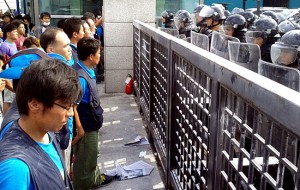The Struggle of SJM and Mando Workers against Capital's Attack
During the last week of July, the day before the summer holiday began, contracted private security squads were sent in to crush workers' struggles at the Hyundai Motor suppliers SJM and Mando. The attacks happened within 10 hours of one another, with management locking workers out at both factories.
Since the advent of the Myung-bak Lee administration capital has executed careful plans to break unions at important worksites in each region across the country: Valeo-Mando in Gyeongju, Sangsin Brake in Daegu, KEC in Gumi and Yoosung Enterprise in Chungcheong. Now this effort to weaken the democratic labor movement has been brought to the metropolitan area with the attack on SJM .Gyeonggi Province) and reached the a national scale with the attack on Mando, a company with worksites around the country. Each time, the method for breaking the union has been similar. As soon as workers begin a strike, a private security squad or hired thugs are brought in. Workers are forced out of factories, the doors of which are then locked. Following management proceeds to allow only those who leave the KCTU-affiliated democratic union or join a yellow union to return to work.
SJM is a central worksite among the affiliates of Korean Metal Workers Union .KMWU) Gyeonggi Branch, while Mando is the largest auto parts supplier in the country and the one structured most similarly to parent auto manufactures. Given that the SJM and Mando have no relationship to one another other than both being Hyundai Motor suppliers, it is widely believed that Hyundai Motor is behind the closely timed attacks. Since the beginning of the 2000s, Hyundai Motor has sought to minimize stock through the introduced "Just In Sequence" .JIS), an extreme version of "Just in Time" production .JIT). JIS involves not only strict planning of the assembly process at Hyundai plants, but also tight control over the timing and sequence of subcontractors' production and supply of parts to bring them into sync with operations at the parent company. Given Hyundai's use of JIS, the blow to production caused by a work stoppage by a strong union at a subcontractor can be severe. For this reason Hyundai has sought to weaken unions at its first tier subcontractors. Against the backdrop of the Lee administration's anti-labor policies, Hyundai's intervention in labor relations at the KMWU's main worksites has grown to new extremes.
3 days into the lock out at Mando, a yellow union was established. During the summer vacation, management carried out individual education for KMWU union members, seeking to convince them to join the new union. Only a week after the yellow union was formed, 1936 out of 2264 KMWU members had joined. When the number of workers who joined the yellow union reached 85% after two weeks the company ceased its lock out. At the same time, it notified the KMWU Mando Chapter of the cancellation of its collective bargaining agreement, saying that it would being procedures to unify bargaining channels now that there was a new bargaining representative.
On September 4, the company fired the president of the KMWU Mando Chapter and other union officers for 'disciplinary reasons'. Having become a minority union .without representative status) in a matter of days, the KMWU Mando Chapter is now trying to rebuild, but the road ahead is a rocky one.
The situation at SJM has been more hopeful. Workers there fought against the company's lock out for over a month. Of 260 KMWU members, only 10 disaffiliated. The remaining 250 gather in front of the factory every morning to protest and take turns maintaining a protest encampment at the factory gates. Having predicted forceful repression, the union officers and members prepared well for their struggle in advance. They are also receiving considerable support from other workers in the Gyeonggi area. KMWU members from other worksites join the SJM Chapter members to maintain the protest encampment each night. At an emergency KMWU Gyeonggi Branch, delegates assembly held on September 5, delegates voted to hold a 6-hour general strike on September 13 in solidarity with the SJM struggle. They also agreed that all KMWU Gyeonggi Branch members would contribute 20,000 won .roughly 18$) a month for six months to a strike fund for the SJM workers.
